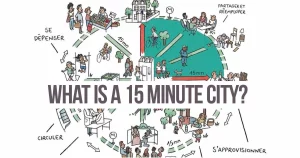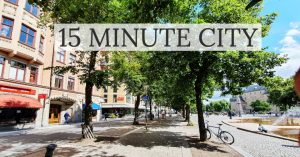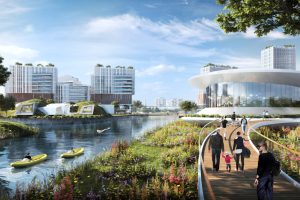The latest buzzword among urban planners is the “15-minute city”—a utopian “green” vision designed to persuade us to live in small, dense urban condos without our cars.
The 15-minute city is a concept developed by a professor at the Sorbonne in Paris. Leave it to an academic to come up with a relatively simple but quixotic idea in which everything we need –workplaces, shops, parks, medical services, schools, etc.—will be within a fifteen-minute walk or bicycle ride from our high-rise domiciles.
“Fifteen-minute cities will be decentralized, which will result in less need for cars and the reimagining of public spaces to include fewer roads, more green space, bike lanes, and sports and leisure amenities,” Professor Carlos Moreno says. “The idea of self-sufficient neighborhoods is not new – before cars became omnipresent, most cities were laid out like this. However, given the urgency of the climate, many cities are looking at ways to reduce emissions and improve residents’ quality of life.”
It sounds picture-perfect—almost faultless in its conception.

What could go wrong with having a city’s inhabitants living near all the goods and services they need to exist? What’s wrong with an idea that allows folks to forego crowded subways, gridlocked expressways, and two-hour commutes in favor of a short walk or bicycle ride to work? What’s wrong with housing people on top of one another in nondescript high-rise structures?
Plenty, says Christine Anderson, a member of the European Parliament.
“Fifteen-minute cities are the beginning of tighter government control of people,” she insists. “Governments can exert control by deciding you can no longer leave your 15-minute immediate area. They don’t have to fence it in or anything. It will be done via digital ID.”
Anderson believes that the COVID pass, the Digital Green Certificate, and the QR codes that became widespread during the COVID pandemic were only test runs for implementing 15-minute cities aimed at tightening government control of people.
In Europe, legislation is already being pushed forward to set up 15-minute cities.
Last April, Milan, Italy’s mayor, Giuseppe Scala, announced he wanted to “rethink the rhythms” of the city, an apt description of the 15-minute concept. Several global mayors promoted the 15 Minute City in a report from the C-40 Cities Climate Leadership Group published last summer.
The report also reemphasized the need to “reallocate more road space to walking and cycling, investing in city-wide walking and cycling networks and green infrastructure.” It also highlighted the need to prioritize. It is vital that in a post-pandemic world we ‘Recover Better,’ and ensure that the rebuilding of our economies features green solutions – in our cities and everywhere else – that will not only spur growth but safeguard our future on the planet.”
Once again, it sounds terrific. But as urban policy analyst Wendell Cox says, “It ignores how most of us want to live, how cars and suburbs have improved our lives and the negative ways the COVID pandemic changed our work and our world.”
Maybe a 15-minute city might work in Europe’s more condensed city environments, but in California, where I live, I can’t imagine anything remotely like a “15-minute city” taking hold—not in a sprawling metropolitan area such as the Los Angeles-San Diego corridor where the ubiquitous automobile is the only form of reliable transportation and where walking to a grocery store, your doctor, or shops would take hours.

But Christine Anderson raises a more ominous point.
“Make no mistake, it’s not about your convenience,” Christine Anderson says. “It’s about total control. It’s not that they want you to be able to have all of these places that you need to get to close by. It’s not about saving the planet, either. If you now fancy another store and it is not in your neighborhood, guess what? You won’t be going to that store anymore. As I said, total control is what we’re talking about.”
Meanwhile, the elites who are proposing 15-minute cities for the great unwashed masses will continue to fly about the world in their private jets and reside in rambling mansions surrounded by high walls and garrisoned gates.
It’s the old “rules for thee, but not for me” tenet.
“In Great Britain, some counties have already passed legislation that allows the government to impose a climate lockdown,” Anderson said. “That’s the next step. That’s what we are talking about. To do that, they will have to have these 15-minute cities where people are restricted within their localities, only allowing them to leave their area two or three times a year. Meanwhile, the elites and the rich can ignore these rules.
“The less fortunate will be left in these 15-minute neighborhoods while the folks who are better off will get to go wherever they want,” Anderson said. “This is what we are talking about.”
Doesn’t sound much like a Utopia to me.
Governments learned a valuable lesson during the two-year-long COVID pandemic. They discovered that fearmongering allowed them to control people with relative ease.

For example, travel was restricted. Schools and businesses were shuttered. Proof of vaccination cards was required to board planes and even to enter a restaurant or business. Masks, most of which were ineffective and worked only as bacteria traps, were mandatory accouterments.
“It was a completely blown out of proportion kind of pandemic,” Anderson argues. “And for what? So pharmaceutical companies could make billions and billions of dollars.”
Those who favor 15-minute cities denounce those opposed to this latest urban planning fad as climate deniers, anti-lockdown activists, and anti-vaxxers. They say those opposed, such as Anderson, belong to a perverse universe of conspiracies formed around a “Great Reset” that will see people locked in their homes by climate-obsessed autocracies.
Farfetched? Opponents like Anderson argue that putting people in 15-minute cities and restricting their travel adds another layer to the manipulation scheme.
The ultimate 15-minute city is under construction in Saudi Arabia’s northwestern desert. It’s a narrow strip of a city called The Line that will be 105 miles long, 220 yards wide, and soar higher than the Empire State Building when finished.

The Line will house 9 million people and cost hundreds of billions of dollars. There will be no cars or roads, and residents will be able to run errands with a five-minute, rather than a 15-minute, walk. High-speed rail will carry people from end to end in 20 minutes.
Construction is underway already, and projections call for 1.5 million people to live in The Line by 2030.
Click to see what The Line will look like when finished. https://youtu.be/r4ox214YLvw
Who knows what Saudi governmental rules will apply to those living in The Line, but Anderson fears that the regulations in European 15-minute-cities will be onerous.
“Fifteen-minute cities are just the beginning,” says Anderson. “There will be a time when you must have a Digital Green Certificate with a QR code. Then, they will tell you where you can go, what you can and cannot do. That’s what we’re talking about. When you take all of this together, there is no other way for me actually to say this—it will be a complete impoverishment and enslavement of all the people. I’m stating it so clearly because that’s what it seems like, and that’s what it looks like to me.”
The question is how much individual freedom people are willing to forego in the face of government dictates and decrees to live in one of these conurbations.
“One day, you’ll be trapped in your 15-minute city, waiting for a drone to deliver your sweet and sour bugs and trying to remember what it was like to be on holiday,” UK author Lisa Keeble said in a recent tweet. “You’ll ask yourself- when did it all go wrong? The answer? When you applauded lockdowns and masks.”
As for me, I may opt for a tree house in the Amazon and an electric pogo stick.
[If you enjoyed this post, please consider subscribing to ForeignCorrespondent and tell your friends to subscribe. IT’S FREE! WHAT A DEAL! If you’ve received this from a friend and would like to be added to our distribution list for future blog posts, please enter your email address in the sign-up for notifications box at https://ronaldyatesbooks.com/category/foreign-correspondent. You can also find my commentaries on Substack at https://ronyates.substack.com/ and the American Free News Network at https://afnn.us. And please feel free to comment. WE LOVE COMMENTS!]

